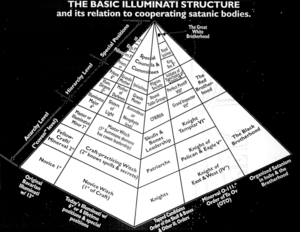Difference between revisions of "Illuminati"
(start) |
m |
||
| (One intermediate revision by one other user not shown) | |||
| Line 1: | Line 1: | ||
{{Group | {{Group | ||
|wikipedia=https://en.wikipedia.org/wiki/Illuminati | |wikipedia=https://en.wikipedia.org/wiki/Illuminati | ||
| + | |ON_constitutes=conspiracy theory | ||
|constitutes=Secret society | |constitutes=Secret society | ||
| − | |description=Depending on the account, a part of history, or a combination of secret societies and organized crime active to today. | + | |description=Depending on the account, a part of history, or a combination of secret societies and organized crime still active to today. |
|image=Illuminati pyramid of power.gif | |image=Illuminati pyramid of power.gif | ||
}} | }} | ||
| − | The '''Illuminati''' (the enlightened) is a name that was first given to a group in [[Bavaria]]. | + | The '''Illuminati''' (the enlightened) is a name that was first given to a group in [[Bavaria]]. Today the term is usually used to describe groups which are trying to take over the government of most countries world wide. |
==Bavarian Illuminati== | ==Bavarian Illuminati== | ||
| − | Historically, the name usually refers to the [[Bavarian Illuminati]], an Enlightenment-era secret society founded on 1 May [[1776]] in Bavaria (today part of Germany) by [[Adam Weishaupt]]. Weishaupt wanted to replace Christianity with a religion of reason, and the members of his society called themselves “Perfectibilists.” The society was carefully structured and divided into three main classes. Weishaupt’s recruitment efforts spread across the cities of Bavaria, and he also made connections with a number of Masonic lodges, where his group often managed to gain a prominent position. The movement over time acquired a rigorously complex constitution and internal communication system, conducted in a cipher. At its zenith, the Bavarian illuminati operated in a very large area, extending from Italy to Denmark and from Warsaw to Paris. The movement was ultimately banned, and Weishaupt was stripped of his professorship at Ingolstadt. No evidence of the Bavarian order appears in the historical record after 1785.<ref>https://www.britannica.com/question/What-was-the-Bavarian-illuminati-group</ref> | + | Historically, the name usually refers to the [[Bavarian Illuminati]], an Enlightenment-era secret society founded on 1 May [[1776]] in Bavaria (today part of Germany) by [[Adam Weishaupt]]. His activity was at the beginning centered around the [[University of Ingolstadt]] where he was professor of canon law. |
| + | |||
| + | Weishaupt wanted to replace Christianity with a religion of reason, and the members of his society called themselves “Perfectibilists.” The society was carefully structured and divided into three main classes. Weishaupt’s recruitment efforts spread across the cities of Bavaria, and he also made connections with a number of Masonic lodges, where his group often managed to gain a prominent position. The movement over time acquired a rigorously complex constitution and internal communication system, conducted in a cipher. At its zenith, the Bavarian illuminati operated in a very large area, extending from Italy to Denmark and from Warsaw to Paris. The movement was ultimately banned, and Weishaupt was stripped of his professorship at Ingolstadt. No evidence of the Bavarian order appears in the historical record after 1785.<ref>https://www.britannica.com/question/What-was-the-Bavarian-illuminati-group</ref> | ||
{{SMWDocs}} | {{SMWDocs}} | ||
==References== | ==References== | ||
{{reflist}} | {{reflist}} | ||
Latest revision as of 14:22, 15 October 2022
| "Conspiracy theory" (Secret society) | |
|---|---|
 | |
| Interest of | Conspiracy Archive, Ted Gunderson, Henry Makow, Fritz Springmeier |
| Depending on the account, a part of history, or a combination of secret societies and organized crime still active to today. | |
The Illuminati (the enlightened) is a name that was first given to a group in Bavaria. Today the term is usually used to describe groups which are trying to take over the government of most countries world wide.
Bavarian Illuminati
Historically, the name usually refers to the Bavarian Illuminati, an Enlightenment-era secret society founded on 1 May 1776 in Bavaria (today part of Germany) by Adam Weishaupt. His activity was at the beginning centered around the University of Ingolstadt where he was professor of canon law.
Weishaupt wanted to replace Christianity with a religion of reason, and the members of his society called themselves “Perfectibilists.” The society was carefully structured and divided into three main classes. Weishaupt’s recruitment efforts spread across the cities of Bavaria, and he also made connections with a number of Masonic lodges, where his group often managed to gain a prominent position. The movement over time acquired a rigorously complex constitution and internal communication system, conducted in a cipher. At its zenith, the Bavarian illuminati operated in a very large area, extending from Italy to Denmark and from Warsaw to Paris. The movement was ultimately banned, and Weishaupt was stripped of his professorship at Ingolstadt. No evidence of the Bavarian order appears in the historical record after 1785.[1]
Related Quotation
| Page | Quote | Author |
|---|---|---|
| Propaganda Due | “It appears that a club has taken the name of Propaganda, and meets once a-week at least, in the form of a Mason Lodge. It consists of persons of all nations, and is under the direction of the Grand Master, the Duke of Orleans. De Leutre is one of the Wardens. They have divided Europe into colonies, to which they give revolutionary names, such as the Cap, the Pike, the Lantern, &c. They have ministers in these colonies. (One is pointed out in Saxony, by marks which I presume are well understood.)” | John Robison |